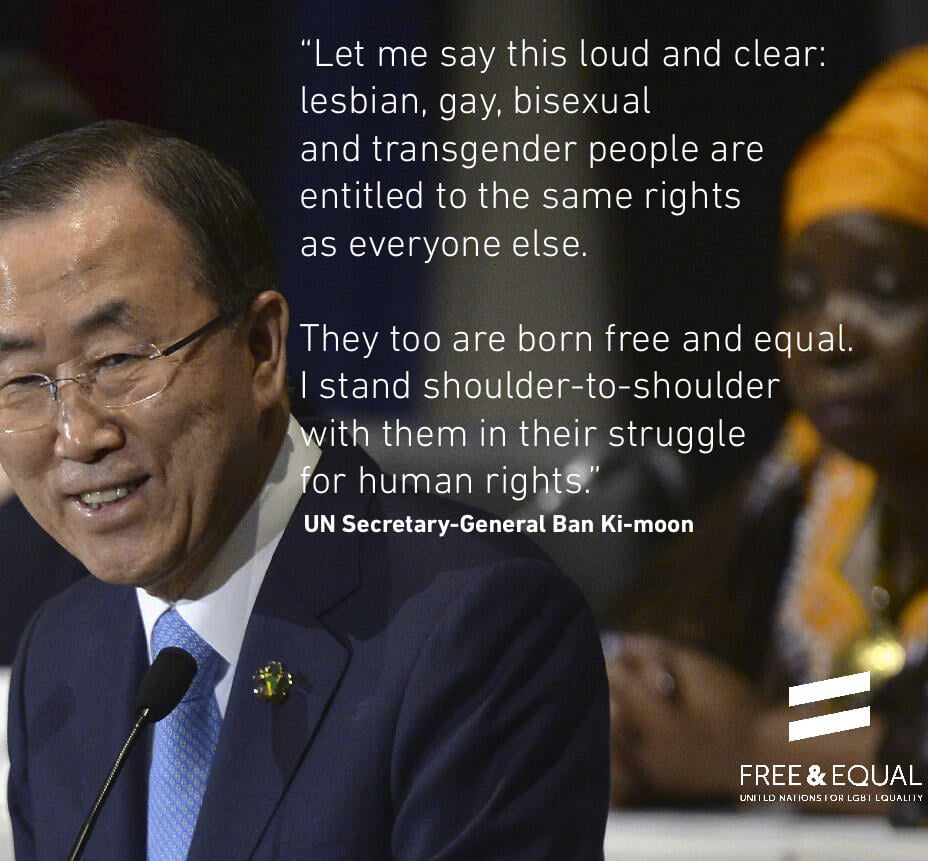United Nations Secretary-General Ban Ki-moon made an impassioned address at the UN's first-ever high-level meeting on LGBT rights, on 21 September 2016, held on the sidelines of the General Assembly. In attendance were the UN LGBT Core Group, including US Vice President Joe Biden, Chilean President Michelle Bachelet and leaders from almost 20 other countries defending the rights of lesbian, gay, bisexual and transgender persons worldwide.
#PATH2EQUALITY: GLOBAL LEADERS DISCUSS PROGRESS TOWARDS LGBT EQUALITY
Thank you very much, President Bachelet. Welcome, everyone. Thank you all for helping push for equal rights and fair treatment for lesbian, gay, bisexual and transgender people and their families.
When I first became Secretary-General, I did not know much about this challenge. I learned by listening. Everyone who lacks understanding should listen closely.
The facts are disturbing. Every year, hundreds are killed, thousands are badly hurt, and millions live their lives under a shadow of discrimination and disapproval. That is an outrage.
Many Governments refuse to acknowledge human rights abuses against LGBT people – or accept responsibility for ending them. Several countries are bucking the tide of history with draconian new punishments for being gay – or even just talking about being gay.
I especially worry for children and youth who are bullied at school, thrown out of their homes or living on the streets. These abuses will only end when countries take concrete steps to protect people: new laws, policies and programmes. This takes leadership and a commitment to work with affected communities.
I ask those who use religious or cultural arguments to deprive LGBT people of their human rights: what do you gain by making others less equal? Is your religion or culture so weak that the only way you can sustain it is by denying others their basic rights? There is no room in our 21st century for discrimination based on sexual orientation or gender identity.
We see encouraging progress. At the United Nations Human Rights Council, more than 100 countries have accepted recommendations aimed at protecting LGBT people from discrimination. And next month, our Human Rights Office will release a study on more than 200 initiatives in 65 countries. In some cases, the starting point has been to decriminalize gay relationships.
Over the past year, three more countries have abandoned criminal sanctions following UN recommendations: Mozambique, The Seychelles and Nauru. I commend their leadership. Many have new laws to stop discrimination, punish hate crimes and restrict hate speech.
We see new measures to end bullying and provide sensitivity training. Almost 40 countries now legally recognize same-sex couples. Some are looking at making it easier for transgender people to have their gender legally recognized.
These major advances happened thanks to brave individuals who stood up for what is right. People like Caleb Orozco, who is here, who I am delighted to welcome. Caleb (from Belize) successfully challenged his country’s anti-gay law in the courts.
The United Nations is committed to action. Three months ago, the Human Rights Council decided to appoint the first ever UN Independent Expert to monitor and report on these violations. Let us applaud this historic step.
The Security Council last year held an unprecedented meeting to discuss targeted violence against LGBT people. I thank President Bachelet and Vice President Biden for their governments’ initiative.
The UN Human Rights Office is leading our ground-breaking UN Free & Equal campaign against homophobia and transphobia. I hope you all join.
Last year, a dozen UN agencies issued a joint statement – the first of its kind – pledging to work to end discrimination against LGBT and intersex people. The UN system is moving forward together.
This progress was hard-fought and hard-won. The LGBT Core Group is our great ally – but we have many adversaries.
There is a [political] cost to speaking up – one which I am proud to pay.
I myself have been criticized by many people around the world, by many Member States. You may not know how much I have been fighting and been criticized by certain Member States. When I made an administrative action to give equal pay and same allowances for those gay couples, even though their home countries do not recognize it, the United Nations for the first time has recognized that, regardless of what their home countries are doing, the UN has recognized it.
Of course many human rights defenders have paid a far higher price. Yesterday in the General Assembly, I appealed for action based on consensus. Lacking unanimity should never stop us. Consensus leads to breakthroughs.
All countries have accepted the principle – enshrined in international law – that human rights are universal.
Consensus is ours. Let’s insist on action.
Dear friends, I will always fight for the equality of the LGBT members of our human family. This work will not leave me when I leave office – and it must not leave the office of the Secretary-General after I depart.
Leadership is essential – and you do not need to have a high position to take a lofty stance.
Let us be inspired by the countless individuals around the world who risk their lives to secure their rights – and leave our world a more free and equal place for future generations.
Thank you for your commitment.
For more on the UN Secretary-General's Free and Equal LGBT Rights initiative, visit https://www.unfe.org


